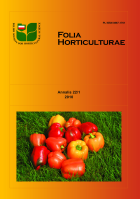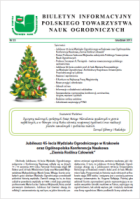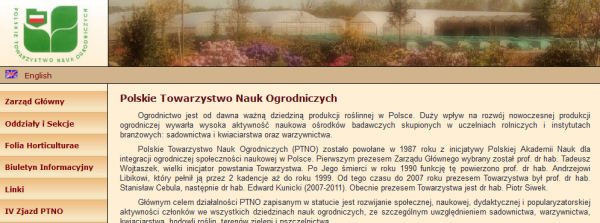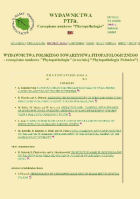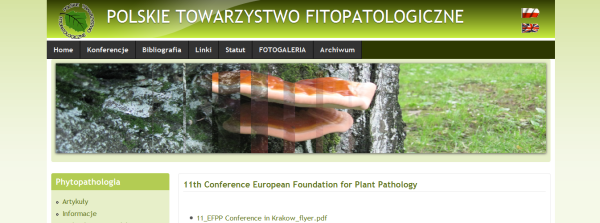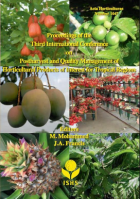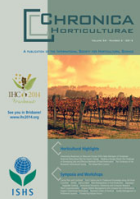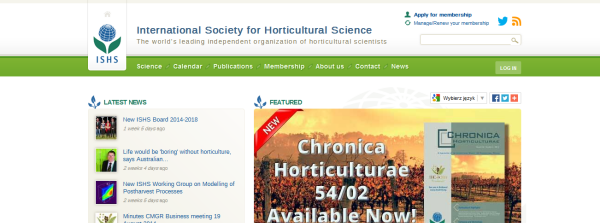Polskie Towarzystwo Nauk Ogrodniczych (PTNO)
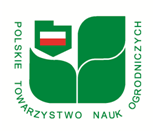
Polskie Towarzystwo Nauk Ogrodniczych zostało powołane w 1987 roku z inicjatywy Polskiej Akademii Nauk dla integracji ogrodniczej społeczności naukowej w Polsce. Głównym celem działalności PTNO, zapisanym w statucie, jest rozwijanie społecznej, naukowej, dydaktycznej i popularyzatorskiej aktywności członków we wszystkich dziedzinach nauk ogrodniczych, ze szczególnym uwzględnieniem sadownictwa, warzywnictwa, kwiaciarstwa, hodowli roślin, terenów zieleni i pszczelnictwa.
Towarzystwo realizuje swoje cele przede wszystkim poprzez: organizowanie odczytów, wykładów, posiedzeń, konferencji, zjazdów i sympozjów naukowych o zasięgu lokalnym, ogólnopolskim i międzynarodowym i w ten sposób promowanie wiedzy ogrodniczej oraz regularne wydawanie naukowego czasopisma ogrodniczego w języku angielskim Folia Horticulturae i traktującego o bieżącej działalności członków PTNO Biuletynu Informacyjnego.
Siedzibą Zarządu Głównego od chwili powstania Towarzystwa jest Kraków. Polskie Towarzystwo Nauk Ogrodniczych obejmuje swoją działalnością całą Polskę poprzez osiem Oddziałów: Kraków, Lublin, Olsztyn, Poznań, Skierniewice, Szczecin, Warszawę i Wrocław. Zrzesza również swoich członków w branżowej Sekcji Hodowli, Nasiennictwa i Biotechnologii Roślin.
Strona internetowa Polskiego Towarzystwa Nauk Ogrodniczych

Polskie Towarzystwo Fitopatologiczne (PTFit)
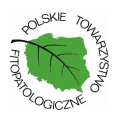
Polskie Towarzystwo Fitopatologiczne jest organizacją zrzeszającą osoby posiadające wyższe wykształcenie i pracujące na polu fitopatologii i ochrony roślin - zarówno w dziedzinie badań (wyższe uczelnie, instytuty resortowe oraz PAN, jednostki wdrożeniowe), jak i wdrożeń, praktyki oraz administracji (jednostki wdrożeniowe, służba ochrony roślin, prasa fachowa).
Celem działalności Towarzystwa jest: przyczynianie się do podnoszenia poziomu nauki o chorobach roślin w Polsce, działanie na rzecz współpracy nauki z praktyką ochrony roślin przed chorobami w trosce o podnoszenie poziomu produkcji roślinnej, przy uwzględnianiu wymogów ochrony przyrodniczego środowiska człowieka, krzewienie idei łączności i współpracy między fitopatologami z różnych ośrodków i instytucji badawczych w kraju i zagranicą.
Zadania te są realizowane przez: systematyczne i planowe urządzanie posiedzeń naukowych połączonych z dyskusją; organizowanie ogólnokrajowych sympozjów towarzyszących Walnym Zgromadzeniom; organizowanie konferencji Sekcji PTFit oraz międzynarodowych konferencji naukowych; wydawanie czasopisma Phytopathologia i innych publikacji naukowych; dokonywanie oceny stanu fitopatologii polskiej i wpływanie na jej perspektywiczne kierunki rozwoju; prowadzenie działalności popularyzującej fitopatologię przez publikacje, odczyty, kursy, wycieczki itp.; nawiązywanie i utrzymywanie w interesie polskiej fitopatologii kontaktów z zagranicznymi towarzystwami fitopatologicznymi i centrami nauki o chorobach roślin.
Polskie Towarzystwo Fitopatologiczne obejmuje swoją działalnością całą Polskę poprzez Oddziały: Bydgoszcz, Kraków, Lublin, Olsztyn, Poznań, Szczecin, Warszawa, Wrocław. Zrzesza również swoich członków w Sekcjach: Patologii Nasion, Chorób Roślin Drzewiastych, Bakteryjnych Chorób Roślin, Biologicznej Ochrony Roślin przed Chorobami, Mikologii i Mikotoksyn, Wirusologicznej, Nazewnictwa i Dydaktyki, Biochemii i Genetyki Patogenów Roślin, Nowych Patogenów i Chorób Roślin.
Strona internetowa Polskiego Towarzystwa Fitopatologicznego

International Society for Horticultural Science (ISHS)
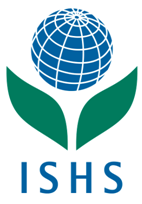
The aim of the ISHS is "...to promote and encourage research and education in all branches of horticultural science and to facilitate cooperation and knowledge transfer on a global scale through its symposia and congresses, publications and scientific structure." Membership is open to all interested researchers, educators, students and horticultural industry professionals.
The International Society for Horticultural Science — in short ISHS — has over 7,500 Individual Members from all over the world, a substantial number of Institutional Members and some 50 Member States/Countries. It is a major source of up-to-date information on global horticultural research. ISHS aims to promote research in all branches of horticulture. It encourages the development of international co-operation, bringing together scientific and technical professionals to stimulate, facilitate and co-ordinate research and scientific activities on a global scale.
The day-to-day conduct of the Society is in the hands of the ISHS Secretariat, based in Leuven, Belgium. The Society's policies are guided by the Board.
The ISHS Council, which meets every two years, is made up of delegates representing the interests of countries or regions, which have contributed a membership fee. Directors are elected by Council at the International Horticultural Congress which is held every fourth year.
In addition to the Council and various sub-Committees, an Executive Committee manages the scientific program. It is composed of the Chairs of the Sections and Commissions. It is via these bodies that ISHS communicates with members who have specific research interests covering the full range of horticultural science. Sections cover the horticultural crops grown around the world. Commissions relate to different scientific and technical disciplines within horticulture.
Sections and Commissions establish Working Groups that focus on specialized subject areas. Working Groups have an elected Chair and membership comprised of eminent horticulturists/horticultural scientists. Currently there are more than 100 such Working Groups and others are formed when a need is identified. New Sections and Commissions have arisen from especially active Working Groups. Thus, the Executive Committee is charged primarily with setting the scientific/technical agenda of the ISHS and its forthcoming programme of work over a 3 to 5 year period.
The success of the ISHS, in relation to its effective communication and leadership of international co-operation, is largely through the 40 or more specialized symposia held annually. These are organized locally in a country, each with a convener, an organizing committee, a scientific committee and an editorial board. Designed to be self-financing, these symposia normally concentrate on a technical subject — a crop or research area. Invited speakers present papers, research findings are debated, discussions held, visits arranged and the editor compiles a monograph published as a volume of Acta Horticulturae. These publications are available, at cost, to all ISHS members attending symposia and are archived in many academic/research libraries. English is the official language of ISHS used at meetings and in communications. Since 2001 the entire Acta Horticulturae library is available online and services the needs of thousands of researchers worldwide who use the www.actahort.org site to stay in touch with advances in horticultural science. Individual copies of Acta Horticulturae can also be purchased from the ISHS Secretariat.
The other avenue for regular communication is Chronica Horticulturae, the quarterly publication of ISHS. In addition to containing a calendar of events, announcements, news items and details of forthcoming events, Chronica reports on the activities of Sections, Commissions and Working Groups. It highlights major issues affecting horticulture — all having an international dimension.
A major benefit of ISHS membership is the privilege of attending the International Horticultural Congress every four years at discounted rates. Congresses are attended by 2,000 or more delegates. They are carefully planned over many years to address all areas of horticultural science of interest to members. The Congress provides opportunities for individuals to present posters or make oral presentations of their current research work. Thus, information is shared with a wide audience. Beside the major sessions, many workshops, symposia and other meetings are held during the Congress. Business meetings of the Society and its Sections and Commissions also take place. There are numerous social gatherings, sight-seeing opportunities, and the chance to see local horticultural industries during specialized field trips.
Website of the International Society for Horticultural Science



